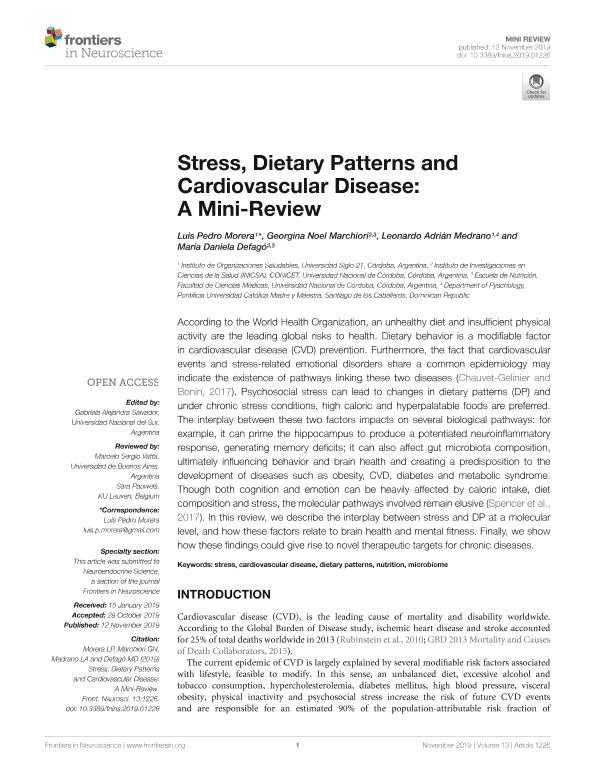Artículo
Stress, dietary patterns and cardiovascular disease: a Mini-Review
Fecha de publicación:
11/2019
Editorial:
Frontiers Media S.A.
Revista:
Frontiers in Neuroscience
ISSN:
0091-3022
e-ISSN:
1662-453X
Idioma:
Inglés
Tipo de recurso:
Artículo publicado
Clasificación temática:
Resumen
According to the World Health Organization, an unhealthy diet and insufficient physical activity are the leading global risks to health. Dietary behavior is a modifiable factor in cardiovascular disease (CVD) prevention. Furthermore, the fact that cardiovascular events and stress-related emotional disorders share a common epidemiology may indicate the existence of pathways linking these two diseases (Chauvet-Gelinier and Bonin, 2017). Psychosocial stress can lead to changes in dietary patterns (DP) and under chronic stress conditions, high caloric and hyperpalatable foods are preferred. The interplay between these two factors impacts on several biological pathways: for example, it can prime the hippocampus to produce a potentiated neuroinflammatory response, generating memory deficits; it can also affect gut microbiota composition, ultimately influencing behavior and brain health and creating a predisposition to the development of diseases such as obesity, CVD, diabetes and metabolic syndrome. Though both cognition and emotion can be heavily affected by caloric intake, diet composition and stress, the molecular pathways involved remain elusive (Spencer et al., 2017). In this review, we describe the interplay between stress and DP at a molecular level, and how these factors relate to brain health and mental fitness. Finally, we show how these findings could give rise to novel therapeutic targets for chronic diseases.
Palabras clave:
CARDIOVASCULAR DISEASE
,
DIETARY PATTERNS
,
MICROBIOME
,
NUTRITION
,
STRESS
Archivos asociados
Licencia
Identificadores
Colecciones
Articulos(CCT - CORDOBA)
Articulos de CTRO.CIENTIFICO TECNOL.CONICET - CORDOBA
Articulos de CTRO.CIENTIFICO TECNOL.CONICET - CORDOBA
Citación
Morera, Luis Pedro; Marchiori, Georgina Noel; Medrano, Leonardo Adrián; Defagó, María Daniela; Stress, dietary patterns and cardiovascular disease: a Mini-Review; Frontiers Media S.A.; Frontiers in Neuroscience; 13; 1226; 11-2019; 1-7
Compartir
Altmétricas




